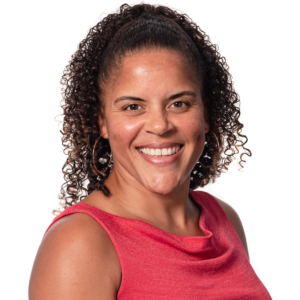
Geneviève DeBose Akinnagbe is a National Board Certified teacher and a Literacy Coach for School Transformation at one of the Partnership’s schools — Edwin Markham Middle School. She started her teaching career in 1999 as a sixth grade English Language Arts and Social Studies teacher at Samuel Gompers Middle School in LA Unified. She has also taught in Oakland, CA and the south Bronx in New York City.
Last year, on the final day of school, I asked my 7th grade students to write me letters sharing their reflections on our class – what worked for them, what didn’t, what things I should change. All the letters offered important feedback for me as a teacher. But one letter in particular highlighted a systemic issue that too many of my students have to deal with. Adriana [not her real name], a 12-year old girl who had attended high-need schools her entire life, expected to have an inexperienced teacher.
Her letter broke my heart.
Dear Ms. DeBose Akinnagbe,
The day I sat in this classroom I didn’t know what to expect. I didn’t expect to have a teacher who actually knew how to teach! Last year we had [teacher’s name intentionally omitted]. She had like zero idea of how to teach us but we all made it! From the experience, my expectations were pretty low. But now I find myself appreciating you greeting us at the door, actually teaching us, laughing with us, and not raising your voice to the point where you lose it. Even though you make us do a lot of work, I realize that the learning environment you created is the best one of all our classes. I think next year you should continue like this. It’s a great way to get the material in the students’ heads. This year I think I got more open towards people. I think it’s because I learned that connections are important in this world, so I try to never be on bad terms with people. I’ll miss how you greet us, how you laugh with us, how you rap and act and how you talk towards us. I have a lot of respect towards you now that I learned who you are. Thank you.
Your student, Adriana
I could share numerous examples and anecdotes that describe teachers who ended up in historically underserved schools, even when they weren’t the right fit. Too often, brilliant students like Adriana have the least experienced teachers and they attend schools with high teacher turnover rates. According to a 2017 report from the Learning Policy Institute, across the country “Teacher turnover rates are 70% higher for teachers in schools serving the largest concentrations of students of color and nearly 50% higher for teachers in Title I schools, which serve more low-income families. These schools are staffed by teachers with fewer years of experience and, in many cases, significantly less training.”
In Los Angeles the situation is no different. “Beneath the Surface: Ensuring LA Schools Have Equitable Access to Educators,” a report from the Partnership for Los Angeles Schools, states that “…only 40% of teachers who had been mandatorily assigned in 2015-16 remained at their school site for one year or more. A significant number of these teachers left their school sites mid-year, which presents a profound obstacle to learning for the impacted students and a huge barrier to stability for the entire school.”
While the bad news is that in Los Angeles, there are countless Adrianas, there also are some things to celebrate. The Los Angeles Unified School District (LA Unified) has done some important work to address teacher staffing issues in the last few years. In June 2018, for example, the “Close the Gap” resolution allowed high-need schools to hire external candidates instead of being limited to a District list. LA Unified has also committed to support high-need schools with priority hiring for new teachers before these candidates become available to other schools. While we’re making progress on hiring decisions, how are we going to ensure that the teachers in high-need schools actually want to stay?
I think it comes down to more supports for teachers in high-need schools. As someone who has taught in high-need schools across the country for 15 years, I know that on days when I was exhausted and the academic, social and emotional work seemed to have no end, certain structures helped sustain me. In one school, I had a reduced teaching schedule so I could support the professional growth of my colleagues as a coach. Being grounded in the work of teaching while having the opportunity to develop my skills as a facilitator of adult learning kept me engaged and excited about coming to school each day. One of my schools held weekly mindfulness sessions for teachers before students arrived so that we had time to center ourselves before the hustle and bustle of the school day. This practice not only helped me build relationships with colleagues, but also gave me tools I could use on my own and with students to maintain a calm and peaceful classroom environment.
At the Partnership, we are working with LA Unified to help remove barriers that will attract more highly qualified teachers to work in low-income, underserved schools, where their impact will transform students’ lives. My personal commitment to equity and social justice will always keep me connected to high-need schools, but I know this is not the case for everyone. We have to create systems and structures that support the critical work of preparing students to be the leaders and changemakers we know they are. We can no longer allow brilliant and promising students to expect ineffective teachers in their classrooms. Adriana and all of our students in LA Unified’s high-need schools deserve highly qualified and experienced teachers, who are also well supported for the rigor of their jobs, and it’s the collective responsibility of LA Unified, UTLA and the greater Los Angeles community to ensure they have them.
